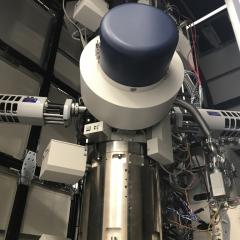We would like to invite you to our next ‘Frontiers in Microscopy and Microanalysis’ Seminar Series with an exciting talk from Dr Jana Ognjenovic from the Frederick National Laboratory for Cancer Research, USA.
Date/Time: Friday 8th October, 11 am to 12 pm (AEST)
Title: Sub-2Å structures with the CryoARM200: From Holes to Hydrogens
Presenter: Dr Jana Ognjenovic
Zoom: https://uqz.zoom.us/j/83987529306
Abstract
Single-particle cryo-EM has evolved from “blobology” into a tool that commonly produces maps at high enough resolution to visualize bound ligands, ordered water molecules, and, for well-behaved samples, even holes in aromatic rings. While such a high level of detail has provided many important biological insights, nearly all of the sub-2Å structures have been obtained using data collected on 300 kV microscopes, which are more expensive than their 200 kV counterparts. Thus, demonstrating that similar resolutions can routinely be achieved using the more affordable 200 kV instruments could contribute immensely to making cryo-EM a more accessible technique. In this presentation, I will show several such examples of sub-2Å structures obtained from data collected on a 200 kV CryoARM microscope.
Biography
Dr. Ognjenović is currently head of the Advance Cryo-EM Technology Group at the Frederick National Laboratory for Cancer Research. Her team explores emerging platforms and develops methodologies for both single-particle analysis and cryo-electron tomography, with an emphasis on pursuits that have the potential to make cryo-EM a more widely accessible technique. Her group’s research interests include signal transduction and the regulation of gene expression, with the goal of using high-resolution cryo-EM structures to gain mechanistic insights and to inform drug design efforts against intractable targets.
https://frederick.cancer.gov/research/advanced-cryo-electron-microscopy-technology-group



